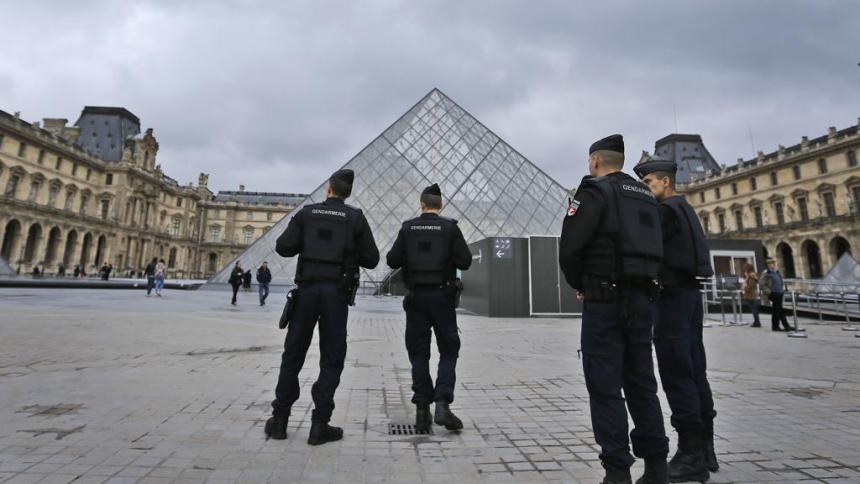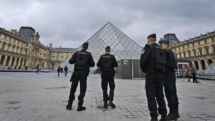Saturday morning saw a crowd gathered outside the museum's main entrance as it began welcoming visitors at 09:30 am (0830 GMT), just 24 hours after the attack.
"I'm quite worried about coming today, but as we weren't able to visit yesterday we decided to come back," 28-year-old Russian visitor Elena Lordugen told AFP.
As usual, soldiers with machine guns could be seen patrolling nearby with museum security staff carrying out routine bag checks.
Ali Tali, a Turkish tourist in his 40s, shrugged off their presence. "We're used these security measures in Turkey," he said.
Investigators say the attacker, who was carrying two machetes and wearing a black T-shirt with a skull design, lunged at four soldiers shouting "Allahu Akbar" ("God is greatest").
One of soldiers, who was struck on the head, was slightly injured and a second soldier opened fire, hitting the assailant in the stomach and leaving him seriously wounded.
Based on his phone and visa records, he is thought to be a 29-year-old Egyptian national living in the United Arab Emirates, Abdallah El Hamahmy, who entered France legally on a flight from Dubai on January 26.
- 'A simple guy' -
Held at a Paris hospital overnight, the suspect's condition stabilised and by Saturday morning it was "no longer life-threatening", a source close to the case said Saturday.
Investigators from the police counterterrorism unit would begin questioning him on Sunday, the source told AFP.
They believe the suspect rented an expensive apartment near the Champs Elysees, the source said.
Police were examining the Twitter account of El Hamahmy after around a dozen messages were posted in Arabic just minutes before the attack.
"In the name of Allah... for our brothers in Syria and fighters across the world," he wrote, before referring to the Islamic State jihadist group in another tweet a minute later.
Speaking to AFP in Cairo, retired police general Reda El Hamahmy said he believed the wounded suspect was his son, Abdallah, who was in Paris on a business trip.
However he said there were no signs his son had been radicalised.
"He went on a company trip and when it was over visited the museum. He was supposed to leave on Saturday," he told AFP, saying his son was married and his pregnant wife was currently staying in Saudi Arabia with their seven-month old son.
"He is a simple guy," he added, describing his family as a "moderate household".
"I can show you pictures where he has no beard," he said. Beards are often grown by devout Muslims.
- 'Hateful crime' -
The government of the United Arab Emirates, which includes Dubai, condemned the "hateful crime" and assured France of its "full solidarity".
President Francois Hollande said that "there is little doubt as to the terrorist nature of this act," an assessment echoed by Prime Minister Bernard Cazeneuve.
Over the past two years, France has suffered a string of terror attacks and has been under a state of emergency since November 2015.
During that period, the Louvre, a former palace in the heart of the city, has seen annual visitor numbers fall to 7.3 million, a drop of around two million.
Security, immigration and the economy are all major issues for voters ahead of this year's presidential and parliamentary elections which are expected to confirm the country's shift to the right after five years of Socialist rule.
----------------------------------------------------------------------------------------------------------------------------
"I'm quite worried about coming today, but as we weren't able to visit yesterday we decided to come back," 28-year-old Russian visitor Elena Lordugen told AFP.
As usual, soldiers with machine guns could be seen patrolling nearby with museum security staff carrying out routine bag checks.
Ali Tali, a Turkish tourist in his 40s, shrugged off their presence. "We're used these security measures in Turkey," he said.
Investigators say the attacker, who was carrying two machetes and wearing a black T-shirt with a skull design, lunged at four soldiers shouting "Allahu Akbar" ("God is greatest").
One of soldiers, who was struck on the head, was slightly injured and a second soldier opened fire, hitting the assailant in the stomach and leaving him seriously wounded.
Based on his phone and visa records, he is thought to be a 29-year-old Egyptian national living in the United Arab Emirates, Abdallah El Hamahmy, who entered France legally on a flight from Dubai on January 26.
- 'A simple guy' -
Held at a Paris hospital overnight, the suspect's condition stabilised and by Saturday morning it was "no longer life-threatening", a source close to the case said Saturday.
Investigators from the police counterterrorism unit would begin questioning him on Sunday, the source told AFP.
They believe the suspect rented an expensive apartment near the Champs Elysees, the source said.
Police were examining the Twitter account of El Hamahmy after around a dozen messages were posted in Arabic just minutes before the attack.
"In the name of Allah... for our brothers in Syria and fighters across the world," he wrote, before referring to the Islamic State jihadist group in another tweet a minute later.
Speaking to AFP in Cairo, retired police general Reda El Hamahmy said he believed the wounded suspect was his son, Abdallah, who was in Paris on a business trip.
However he said there were no signs his son had been radicalised.
"He went on a company trip and when it was over visited the museum. He was supposed to leave on Saturday," he told AFP, saying his son was married and his pregnant wife was currently staying in Saudi Arabia with their seven-month old son.
"He is a simple guy," he added, describing his family as a "moderate household".
"I can show you pictures where he has no beard," he said. Beards are often grown by devout Muslims.
- 'Hateful crime' -
The government of the United Arab Emirates, which includes Dubai, condemned the "hateful crime" and assured France of its "full solidarity".
President Francois Hollande said that "there is little doubt as to the terrorist nature of this act," an assessment echoed by Prime Minister Bernard Cazeneuve.
Over the past two years, France has suffered a string of terror attacks and has been under a state of emergency since November 2015.
During that period, the Louvre, a former palace in the heart of the city, has seen annual visitor numbers fall to 7.3 million, a drop of around two million.
Security, immigration and the economy are all major issues for voters ahead of this year's presidential and parliamentary elections which are expected to confirm the country's shift to the right after five years of Socialist rule.
----------------------------------------------------------------------------------------------------------------------------









 Home
Home Politics
Politics











